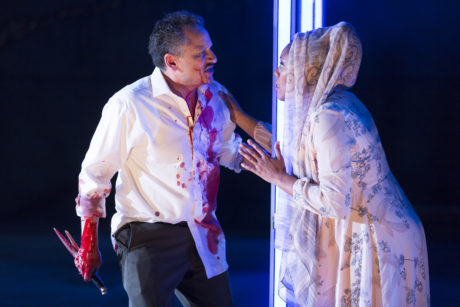Samuel Taylor Coleridge said that seeing Edmund Kean play Shakespeare was like “reading Shakespeare by flashes of lightning.” Acclaimed Director Liesl Tommy brings us Shakespeare torn asunder by gunfire. It is a blazingly original concept. The production is part of the “Clarice Smith Series: New Directors for the Classics” at Shakespeare Theatre Company.

What happens when a foreign country intervenes in the governing of another country? The result, of course, is chaos. What could be a more contemporary theme? Chaos is exactly what greets us as soldiers enter, with what look like machine guns, in Scene I of this literally explosive Macbeth.
The beauty and sensuousness of Shakespeare’s language is still there, but we are in a modern universe, teeming with war crimes, hi-tech cruelty, and the bitter knowledge that every one of us is expendable at any time. Some of the finest moments of the production are when the killers matter-of-factly take pictures of their victims with cell phones.
Nikkole Salter is a superb Lady Macbeth, full of energy, pride, and deep sensuality. One of the best moments of the production comes when she withdraws from Macbeth’s growing cruelty. For her, the excitement of the murder was in the anticipation; once the deed is done, she falls apart.
Jesse J. Perez brings us Macbeth as Everyman; he hesitates at first, but is shamed into action by his wife’s intimation that to flee from regicide is less than masculine. (This to Macbeth, who in the first scene is described as a ruthless, successful warrior.) He is a pawn in a political as well as a marital sense, and this diminishes the power of his personality somewhat. However, this is precisely the point. The assassin of today is restless, incendiary, true; but he smiles like a game-show host and grins ghoulishly, like a host at a party of the dead.
The production is set in present and future Africa. The costumes are full of exotic colors and textures. Most of the women wear hijabs. The men wear army uniforms and berets. Director Tommy has created a visually magnificent universe of wildly diverse images, which grow and multiply on the stage as if by magic. The golden and green scenic design, the sumptuous clothing, and the unpredictable sounds of shooting and torture keep us on edge and yet strangely mystified. Lady Macbeth is dressed to kill in elaborate head-dresses and elegant gowns. In a sense, she and her husband exchange places; he, once guilt-ridden, is now ever more steeped in blood. She, mad with guilt, becomes ghost-like and insubstantial.
The Three Witches, played with style and bravado by Tim Getman, Naomi Jacobson, and David Bishins, are government operatives, who spy on the Macbeths as they fulfill the objectives of their Machiavellian Master/Mistress, Hecate (Stephen Elrod). They are after the resources of Macbeth’s unnamed African country, and are willing to commit any crime, even the murder of children, to get what they want. The characterization of Hecate has been given a stunningly unusual modification which I will not give away, but which adds to the “ripped from today’s headlines” approach to the play. (Russian accent, anyone?)
Two performances stand out: Myra Lucretia Taylor as the Porter and Doctor, down to earth and determined, brings a refreshingly unpretentious humor to her roles. Marcus Naylor’s Macduff is deeply emotional, allowing us to connect to his sorrow and empathize with his character.
Petronia Paley as Duncan has dignity and authority, along with an air of compassion which makes her murder even more horrifying. Malcolm (Corey Allen) and Donalbain (Nicole King) turn to one another with a heartrending desperation as they realize they will likely be blamed for Duncan’s death. Nilanjana Bose as Lady Macduff has a lovely scene with her little daughter (Trinity Sky Debreu) before all hell breaks loose. Banquo (McKinley Belcher III) and son Fleance (Brett Johnson) spar with each other in a display which suggests great affection between father and son as well as physical dexterity.
The Scottish Lords Ross (Sophia Ramos), Lennox (Horace V. Rogers) and Angus (JaBen Early), excellent performers all, are sometimes overwhelmed by the chaos that surrounds them. Politics and violence seem to flatten their characters out somehow, as if mere actors cannot compete with the noise, theatrics, and constant brutality. This is probably inevitable in a production which emphasizes politics over personal relationships. Sometimes the wonders of Shakespeare’s language are overshadowed by the ever-changing spectacle.

The onstage movement and visual inventiveness of the production are remarkable. Credit goes not only to Director Liesl Tommy but to the Ensemble, Stephen Elrod, Nicole King, Scotland Newton, Kelsey Rainwater, Christopher Michael Richardson, Brayden Simpson, and Anu Yadav. Scenic Designer John Coyne, Lighting Designer Colin K. Bills and Costume Designer Kathleen Geldard have been rightfully praised for their imagination and technical wizardry. Sound Design and Original Music by Broken Chord complement the visual aspects of the production with exceptional skill. Special mention must be made of Fight Directors/Action Choreographers Rick Sordelet and Christian Kelly-Sordelet, whose work is outstanding.
The question remains; what is the experience of the play, what is it like to see it? Visually and aurally, it is a feast for the senses. The acting has moments of notable intelligence and insight. But the theme of chaos overwhelms the text itself, which becomes almost flat and unremarkable. This makes it more difficult to identify with the characters. The advantage of Shakespeare in a contemporary setting is obvious; we are fully alert to each development because we are not lulled into complacency by the familiar Elizabethan environment. But to introduce an audience to a created world, the world we are presented with must make internal sense.
Here, the production can sometimes be confusing. Where or when are we exactly? Did Lady Macbeth really go to Harvard? Isn’t a Harvard t-shirt better left to the actress’s preparation than included in the production itself? Some of the casting of women in male roles feels arbitrary, as much as I applaud the concept. Sometimes the inclusion of modern elements can seem jarring. And when an actor says, “O Scotland, Scotland…” it is hard not to wonder whether the line should be cut or changed.
On the other hand, perhaps this sensation of dislocation and chaos is exactly what Director Tommy intended us to feel. By supporting the vision of emerging directors, we acclimate our beloved Shakespeare to the landscape of a new generation and a young century.
Running Time: Two hours and 50 minutes, with a 15-minute intermission.
Macbeth plays through May 28, 2017, at the Shakespeare Theatre Company’s Sidney Harman Hall – 610 F Street NW, in Washington, D.C. For tickets, call the box office at (202) 546-1122, or purchase them online.
LINK:
‘Macbeth’ at Shakespeare Theatre Company reviewed by Julia Hurley.





